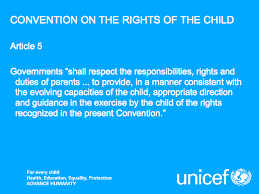
States Parties shall respect the responsibilities, rights and duties of parents or, where applicable, the members of the extended family or community as provided for by local custom, legal guardians or other persons legally responsible for the child, to provide, in a manner consistent with the evolving capacities of the child, appropriate direction and guidance in the exercise by the child of the rights recognized in the present Convention.
What does article 5 say?
Article 5 introduces the idea that children should be able to exercise their rights as they acquire the competence to do so. States should take this right into account when establishing minimum ages on particular issues.
This article and the Convention as a whole places parents centre stage in the child's development. However, parental guidance must be geared towards supporting children to exercise their rights and make their own decisions, respecting the extent to which children can do this for themselves. Rights are not contingent upon a person's ability to claim them, but extend to all.
Why is this important?
This article provides an additional way to age of assessing children's maturity and capacity for making decisions. This is particularly important for decisions that must be made on a case by case such as consent to medical treatment.
Together with article 18, which asserts parents’ common responsibilities in raising their children, it provides a basis for the relationship between the child, their parents and the State.
What are the problems?
Children face a confusing array of minimum ages at which they are deemed capable of making decisions for themselves - from getting a job to accessing confidential medical advice, to getting married.
The idea of minimum ages stems from adults' presumption that children lack capacity and must therefore be protected from the consequences of their decisions. Age restrictions are one way of achieving this protection, but they ignore the fact that children acquire maturity at different rates as well as a whole range of other factors which influence children's maturity. In some societies for example, children are already taking on responsibilities such as caring for younger siblings or a parent who uses drugs or alcohol that would be considered exceptional elsewhere; in other places, children are overprotected to the point where they are not allowed to play outside or say what they think or feel, denying them the chance to grow and find out who they are.
Children certainly require protection and adult guidance as a result of their young age and lack of experience. No child should be exposed to violence or exploitation, and no child should be forced to make a decision they don't want to make. However, all children should be listened to irrespective of age, their views should be taken seriously and their right to privacy and confidentiality should be recognised. Involving children in what is happening at home and in the community, taking their views into account and allowing them to make mistakes promotes their self-confidence and develops their maturity which in turn equips them to avert risks.
Denying children their feelings and opinions tells them they don't count, leaving them unable to protect themselves. The right to confidential medical advice and counselling is particularly pertinent, especially where children's safety or well-being is at stake, such as for children experiencing violence or abuse at home and those seeking sexual and reproductive health education or services. In such cases, children should have the right to confidential advice without parental consent at all ages. Even where children lack capacity, any decision about their health or other area of their lives must take their views into account as central to determining their best interests.
Where children are overprotected, adults often do not recognise how capable they are. Children often have to deal with challenging situations - bullies at school or family break-ups, for example.
What can States do about it?
The Convention challenges the idea that parents have absolute rights over children, implying that parental responsibility should be defined in law. It does not specifically define parental responsibilities, but indicates that parents should provide appropriate support for children to claim all their rights in the Convention.
Article 5 seeks to encourage respect for children's capacity to exercise their rights and involve them in decisions, while balancing this with their relative lack of experience to protect them from harm, such as violence and economic exploitation. In practice, this means extending the fullest possible protection to all children from harm, for example, involvement in armed conflict, while encouraging and nurturing rights relating to children's autonomy, such as freedom of expression, which allow them to grow and participate in society. This balancing act has provoked controversy in many areas of children's rights, such as the role of work and their treatment in the justice system.
The concept of evolving capacities acknowledges that children’s development is a journey and, together with the right to be heard (article 12), that they are entitled to be involved in decisions affecting them from the earliest possible age. The CRC asserts the value of children's views and of giving them weight in accordance with their age and maturity. This approach advocates taking account of children's individual characteristics and experiences, rejecting a strictly age-based approach. Some States include this concept in legislation, particularly where decisions about healthcare are concerned.
In many countries, age continues to be the main way in which children's capacity is determined and children acquire certain rights before the age of majority. The Committee encourages States to ensure where minimum ages exist that they are consistent, so the minimum age of admission to employment for example should not be lower than the minimum age for leaving compulsory education. It also insists that these are non-discriminatory, so apply to all children equally (art. 2).
Source: Crin
 FR
FR EN
EN AR
AR








